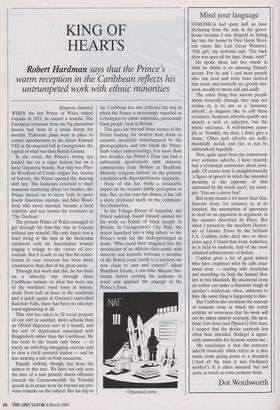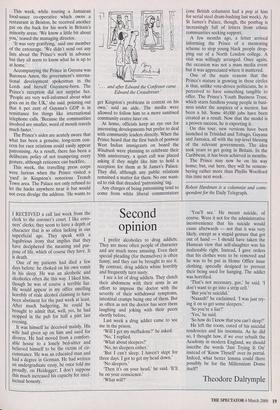KING OF HEARTS
Robert Hardman says that the Prince's
warm reception in the Caribbean reflects his untrumpeted work with ethnic minorities
Kingston, Jamaica WHEN the last Prince of Wales visited Guyana in 1923, he caused a scandal. The European hostesses from the big plantation houses had been in a social frenzy for months. Elaborate plans were in place to ensure introductions to the future Edward VIII at the mayoral ball in Georgetown, the capital of what was then British Guiana.
In the event, the Prince's roving eye landed not on a sugar heiress but on a local Guyanese beauty. Not only was Phyl- lis Woolford of Creole origins but, horror of horrors, the Prince opened the dancing with her. The hostesses returned to their mansions muttering about tar brushes, the Prince moved on to more balls in more South American capitals, and Miss Wool- ford, who never married, became a local celebrity and was known for evermore as `The Duchess'.
The present Prince of Wales managed to get through his four-day stay in Guyana without any scandal. His only dance was a brief swing of the hips in the Iwokrama rainforest with six Amerindian women singing a eulogy to the virtues of eco- tourism. But it is safe to say that his contri- bution to race relations has been more constructive than that of his great-uncle.
Through last week and this, he has been on a nine-day trip through three Caribbean nations on what has been one of the worthiest royal tours in history. Aside from half an hour in the rainforest and a quick squint at Guyana's unrivalled Kaieteur Falls, there has been no old-style royal sightseeing at all.
This visit has taken in 20 social projects of one sort or another, more schools than an Ofsted inspector sees in a month, and the sort of deprivation associated with Bangladesh rather than the Caribbean. He has been to the beach only twice — to watch an anti-drug-smuggling exercise and to view a coral research station — and he was wearing a suit on both occasions.
Equally striking, though, has been the subtext to this tour. We have not only seen the start of a new princely charm offensive towards the Commonwealth: his Trinidad speech in its praise went far beyond any pre- vious remarks on the subject. But his trip to the Caribbean has also reflected the way in which the Prince is increasingly regarded as a champion by ethnic minorities, particularly black people, back in Britain.
This goes far beyond those scenes of the Prince bashing the nearest steel drum (a scenario invariably manufactured by the photographers, and one which the Prince finds rather embarrassing). For more than two decades, his Prince's Trust has had a substantial involvement with minority communities from Brixton to Bradford. Minority religions feature on the princely schedules with disproportionate regularity.
None of this has made a noticeable impact on the broader public perception of him. But, as this tour has shown, it has left a more profound mark on the communi- ties themselves.
In the Tobago House of Assembly, the Prince suddenly found himself saluted for his work on behalf of black people in Britain. In Georgetown's City Hall, the mayor launched into a long tribute to the Prince's work for the underprivileged at home. 'Who could have imagined that the descendant of an African slave could, with sincerity and warmth, welcome a member of the British royal family to a territory we now claim to own and control?' asked Hamilton Green, a one-time Marxist fire- brand, before inviting his audience to stand and applaud the concept of the Prince's Trust.
Organised crime This week, while touring a Jamaican food-sauce co-operative which owns a restaurant in Brixton, he received another pat on the back for his work in Britain's minority areas. 'We know a little bit about you,' teased the managing director.
`It was very gratifying,' said one member of the entourage. 'We didn't send out any lists about the Prince's work in advance but they all seem to know what he is up to at home.'
Accompanying the Prince in Guyana was Baroness Amos, the government's interna- tional development spokesman in the Lords and herself Guyanese-born. The Prince's reception did not surprise her. `People are very well-informed about what goes on in the UK,' she said, pointing out that 6 per cent of Guyana's GDP is in remittance for things like international telephone calls. 'Because the communities involved are smaller, word of mouth travels much faster.'
The Prince's aides are acutely aware that what has been a genuine, long-term con- cern for race relations could easily appear patronising. As a result, there has been a deliberate policy of not trumpeting every gesture, although reticence can backfire. This week, the travelling press corps were furious when the Prince visited a `yard' in Kingston's notorious Trench Town area. The Palace not only refused to let the hacks anywhere near it but would not even divulge the address. 'He wants to ` . and after Edward the Confessor came Edward the Crossdresser.'
get Kingston's problems in context on his own,' said an aide. The media were allowed to follow him to a more sanitised community centre later on.
At home, officials keep an eye out for interesting developments but prefer to deal with community leaders directly. When the Prince heard that the first batch of postwar West Indian immigrants on board the Windrush were planning to celebrate their 50th anniversary, a quiet call was placed asking if they might like him to hold a reception for them at St James's Palace. They did, although any public relations remained a matter for them. No one want- ed to risk that dreaded 'patronising' tag. Any charges of being patronising tend to come from white liberal commentators (one British columnist had a pop at him for serial steel drum-bashing last week). At St James's Palace, though, the postbag is increasingly full of letters from ethnic communities seeking support.
A few months ago, a letter arrived informing the Prince of a mentoring scheme to stop young black people drop- ping out of a North London college. A visit was willingly arranged. Once again, the occasion was not a mass media event but it was appreciated where it mattered.
One of the main reasons that the Prince's stature is growing in these circles is that, unlike vote-driven politicians, he is perceived to have something tangible to offer. The Prince's Youth Business Trust, which starts fundless young people in busi- ness under the auspices of a mentor, has been a hit. Some 40,000 jobs have been created as a result. Now that the model is a proven success, he is exporting it. On this tour, new versions have been launched in Trinidad and Tobago, Guyana and Jamaica, all with the top-level blessing of the relevant governments. The idea took years to get going in Britain. In the Caribbean, it has been achieved in months.
The Prince may now be on his way home; but, out here, they will be remem- bering rather more than Phyllis Woolford this time next week.
Robert Hardman is a columnist and corre- spondent for the Daily Telegraph.



































































 Previous page
Previous page